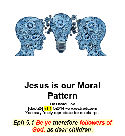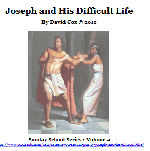Ads
False Prophets lord over other’s salvation Commentary examines 1 Peter 5:3 and 2 Corinthians 1:23-24 about not lording over others’ salvation.
Note: Commentary notes are from Biblehub.com on the specific verses indicated.
Contents
- 1 Not Lording over another’s salvation
- 2 1 Peter 5:3
- 3 “Lording over”
- 4 2 Corinthians 1:23-24
- 4.1 Benson Commentary
- 4.2 Barnes Notes
- 4.3 Ellicott’s Commentary
- 4.4 Barnes Notes
- 4.5 Jamiseon-Faussett-Brown
- 4.6 Matthew Poole
- 4.7 Gill’s Commentary
- 4.8 David Cox Note
- 4.9 Cambridge Commentary for Bible Schools and Colleges
- 4.10 More Posts on False Prophets
- 4.11 More Posts under the Profile of the False Prophet Category
- 5 Read Tracts about False Prophets and the True Man of God
Not Lording over another’s salvation
1 Peter 5:3
1 Peter 5:3 Neither as being lords over God’s heritage, but being ensamples to the flock.
Peter’s declaration is one, clarifying that the only biblical leadership style is being a personal example of the spiritual principles that one preaches and teaches to others. The minister must first and foremost be the fulfillment of what he is teaching. Hypocrisy is a poison in the work of God.
Ellicott on 1 Peter 5:3
“There is a sense in which the heads of the Church are, and ought to be, lords and princes over the rest; but this is very different from “lording it,” acting tyrannically, forgetting the constitutional rights of their subjects…. ‘over the lots’… Here, therefore, we must understand “the lots,” over which the clergy are not to lord it, to be the different congregations, districts, parishes, dioceses, which had been allotted to them.”
Pulpit Commentary on 1 Peter 5:3
“lording over” …implies something of scorn and tyranny or even of hostility.
Rather than a minister seeing the sheep as the owner’s precious possession, he despises both the Master and the Master’s treasure by mistreating the sheep, first with a deep feeling of scorn in his heart towards them, which manifests itself as tyranny, which is lording over them, and end in open hostility. The hidden point in this process is that the bad minister is not really one of the sheep himself, i.e. he isn’t really saved, even though he says he is, and he disguises himself as one. Wolves in sheep’s clothing.
Benson Commentary on 1 Peter 5:3
“Behaving in a haughty, domineering manner, as though you had dominion over their consciences. From this prohibition it would seem that, in the apostle’s days, the bishops or elders were beginning to assume that dominion over their flocks, which in after times they carried to the greatest height of tyranny….
But being ensamples to the flock — Setting them an example worthy of their imitation; and therefore, being of a meek and lowly, kind and condescending mind, and be having toward them with such gentle, tender solicitude for their salvation, and such an entire freedom from the very appearance either of avarice or ambition, that you may gain their confidence, and win their affections.”
Barnes Notes on 1 Peter 5:3
Neither as being lords – Margin, “overruling.” The word here used (κατακυριεύω katakurieuō) is rendered “exercise dominion over,” in Matthew 20:25; exercise lordship over, in Mark 10:42; and overcame, in Acts 19:16. It does not elsewhere occur in the New Testament. It refers properly to that kind of jurisdiction which civil rulers or magistrates exercise. This is an exercise of authority, as contra-distinguished from the influence of reason, persuasion, and example.
The latter pertains to the ministers of religion; the former is forbidden to them. Their dominion is not to be that of temporal lordship; it is to be that of love and truth. This command would prohibit all assumption of temporal power by the ministers of religion, and all conferring of titles of nobility on those who are preachers of the gospel… they were not to domineer over the particular congregations committed by Providence to their care.
Orders by a civil governor have to be carried by those under his authority, no matter what the servant’s heart is about that. As Christians, God treats us as friends in that He freely teaches us the reasoning and persuades us of the why of His orders. But ministers have to follow that same example as Christ, that is, their leadership of God’s flock is by personal example, rooted in defining their practices and doctrines from the Bible.
John 15:15 Henceforth I call you not servants; for the servant knoweth not what his lord doeth: but I have called you friends; for all things that I have heard of my Father I have made known unto you.
Matthew Poole Commentary on 1 Peter 5:3
Neither as being lords; not exercising any such lordship or dominion over the people, as temporal lords and magistrates exercise over their subjects, Matthew 20:25,26, &c.; Luke 22:25 compare 2 Corinthians 1:24.
Meyer’s New Testament Commentary
“With κατακυρ. cf. for meaning and expression Matthew 20:25-28 ; 2 Corinthians 1:24); it is not equal to κυριεύειν (Steiger), but the prefixed κατα intensifies the idea of κυριεύειν: “to exercise a sway, by which violence is offered to those who are under it.”(269)
Again, the idea is to force people to do the will of the dictator. Either they comply, or something bad happens, eventually causing their position and esteem among the group to be lowered, or they leave entirely.
Cambridge Bible for Schools and Colleges
The word for “lording” implies an authority exercised both wrongfully and oppressively. Ambition, the love of power for the sake of power, is, from the Apostle’s standpoint, as great a hindrance to true pastoral work as avarice.
Unfortunately, the dictator-pastor actually thinks that his understanding is the final word in all matters of faith and practice. He forces his will on the flock because of his decisions and understandings, even though he may not fully understand the experiences or the point of view of others.
Pulpit Commentary
Neither as being lords over God’s heritage; rather, as in the Revised Version, neither as lording it over the charge allotted to you. The κατά ιν τηε verb κατακυριέω is not only intensive, it implies something of scorn and tyranny or even of hostility, as also in καταδυναστεύω (James 2:6); comp. Matthew 20:25. The literal rendering of the clause is, “lording it over the lots.”
“Lording over”
Preceptaustin.org
“Lording (2634) (katakurieuo from katá an intensifier or down + kurieúo have dominion over) means to have dominion “down” on others and includes the idea of domineering as in the rule of a strong person over one who is weak. It means to exercise dominion over, bring under one’s power, bring into subjection, to become master, gain dominion over or to subdue.”
The preposition kata (“down”) indicates intensity and depicts a heavy-handed use of authority for personal aggrandizement, manifesting itself in the desire to dominate and accompanied by a haughty demand for compliance. It speaks of a high-handed autocratic rule over the flock, something forbidden of true shepherds. This cautionary note however does not do away with God-ordained, properly exercised authority which is to be administered in the local church by the pastor and the elders. Other Greek verbs are used for the exercise of legitimate authority (see [proistemi] 1 Thessalonians 5:12-13) [[4291] stand before in rank, have charge over in 1 Thes 5:12,, 17, poimaino in 1 Peter 5:2).
The idea of exerting lordship over others combines elements of power and authority, the root word kurios being derived in turn from a root meaning “to swell,” “to be strong,” so that kurios means “having power,” “empowered,” “authorized,” “valid.” The power denoted is a power of control rather than physical strength.
TDNT writes that…
Although the force of the katá is mostly lost in ordinary usage, it conveys the sense of rule to one’s own advantage in Mk 10:42 (Gentile rulers), Acts 19:16 (the evil spirit), and 1 Pet. 5:2-3 (the admonition to the elders). (Kittel, G., Friedrich, G., & Bromiley, G. W. Theological Dictionary of the New Testament. Eerdmans)
The [present tense](present “Continous action, habitual, reflects one’s lifestlye, etc”) describes this behavior as a habitual practice….
In this context, “lording it over” means to dominate someone or some situation and implies leadership by manipulation and intimidation.
katakurieo in the Septuagint refers to God’s “lordship in exercising complete dominion” Psa 27:8; Genesis 1:28; cp Genesis 9:1. Psa 119:133; Jeremiah 3:14; Ezekiel 34:4-5.
Lording it over others is the third major temptation for a pastor, the first being laziness (1Peter 5:2) and the second being dishonest finances (1Peter 5:2). All are to be assiduously avoided by shepherds and elders!
MacDonald rightly comments that…
Many of the abuses in Christendom would be eliminated by simply obeying the three instructions in verses 2, 3. The first would abolish all reluctance. The second would spell the end of commercialism. The third would be the death of officialism in the church. (MacDonald, W., & Farstad, A. [Believer’s Bible Commentary : Old and New Testaments. Nashville: Thomas Nelson]
David Cox Note – Let’s clarify his three points.
“The first would abolish all reluctance.” “taking the oversight thereof, not by constraint, but willingly”
“The second would spell the end of commercialism.” “not for filthy lucre, but of a ready mind;”
“The third would be the death of officialism in the church.” “Neither as being lords over God’s heritage, but being ensamples to the flock”
Jesus directly condemned such abuse of authority among His followers (Mt 20:25, 26, 27; Mk 10:42, 43, 44). The tragic impact of such an attitude is illustrated by the account of Diotrephes in 3 Jn 9-10. All genuine rule in the church is in no sense a lordship but an administration of Christ’s lordship by His willing servants.Shepherds and elders should be examples, not dictators. They should be walking out in front of the flock, not driving them from behind. They should not treat the flock as if it belonged to them. This strikes at the very heart of authoritarianism!
https://www.preceptaustin.org/1peter_verse_by_verse_51-14#5:3
See Tracts explaining these points…
2 Corinthians 1:23-24
2 Corinthians 1:23 Moreover I call God for a record upon my soul, that to spare you I came not as yet unto Corinth.
2 Corinthians 1:24 Not for that we have dominion over your faith, but are helpers of your joy: for by faith ye stand.
Benson Commentary
Not that we have dominion over your faith — Power to impose upon you articles of faith or rules of practice, which the Lord hath not enjoined, or have any authority to dictate what you should believe or do; this is the prerogative of God alone: nor would we exert the power with which Christ hath endowed us, to any tyrannical or overbearing purposes. But are helpers of your joy — Co- workers with Christ to promote your comfort, by establishing you in that faith from which all comfort springs;
David Cox Note – Paul’s point is that a pastor cannot do or impose any point of doctrinal belief nor practice as obligatory on the flock except that which Christ commands.
Barnes Notes
This verse, with the subsequent statements, is designed to show them the true reason why he had changed his purpose, and had not visited them according to his first proposal. And that reason was not that he was fickle and inconstant; but it was that he apprehended that if he should go to them in their irregular and disorderly state, he would be under a necessity of resorting to harsh measures, and to a severity of discipline that would be alike painful to them and to him.
Dr. Paley has shown with great plausibility, if not with moral certainty, that Paul’s change of purpose about visiting them was made before he wrote his First Epistle; that he had at first resolved to visit them, but that on subsequent reflection, he thought it would be better to try the effect of a faithful letter to them, admonishing them of their errors, and entreating them to exercise proper discipline themselves on the principal offender; that with this feeling he wrote his First Epistle, in which he does not state to them as yet his change of purpose, or the reason of it; but that now after he had written that letter, and after it had had all the effect which he desired, he states the true reason why he had not visited them.
David Cox Note – So rather than coming in person to Corinth to set things in order, Paul feared that such an action by him would be misinterpreted to give validity in other contexts for people to rule or dominate the faith of the brethren. Instead of giving orders, commanding when it could be misinterpreted and equally poorly applied by others to excuse their domineering, he chose to set forth the corrections of doctrine and practice in a letter, which is our epistles from Paul to this church. This highlights the understanding of Paul that God’s ministers are very limited in what they impose, because it easily becomes lording over. Just because one person sees the solution to situations one way, (whether he has God’s wisdom or not), the man of God has to have a rigid adherence to establishing everything with Scripture. God’s rule has to reign supreme. This is extremely hard when a man is in administration (and responsible), and yet having the wisdom of God, he has to exposit Scripture that supports and directs actions, conduct, and doctrine according to what God has given in the Holy Word.
Rebuke is a commonly used part of the work of a pastor, yet even in rebuking the people of God, the pastor has to limit such rebukes to what Scripture says (rebukes all), and not “get personal” either in being offended nor in getting mad in doing the rebuke. Rebuke have to be kept clean and non-personal. It is as when a doctor actually mad and upset with a patient that continues to smoke when he tells him he should stop smoking. A professional doctor will not make the matter a personal bitterness, because doing so would contaminate any further service to the patient that the doctor could do for him, and could corrupt the doctor’s professionalism as far as other patients.
Ellicott’s Commentary
He has scarcely written, or uttered, the words which imply authority, when the thought comes to him that he may seem to claim too much. He shrinks from “lording it over God’s heritage” (1Peter 5:3), and half apologises for so strong a word as “sparing.” He puts forward, therefore, the other side of his work. He was really seeking, not to domineer, or cause pain, but to be a fellow-worker with their “joy and peace in believing” (Romans 15:13). He knows that they have a standing-ground, independently of him, in their faith in Christ, and he seeks to confirm that faith.
Barnes Notes
“The course which we have pursued has been chosen not because we wish to lord it over your faith, to control your belief, but because we desired to promote your happiness. Had the former been our object, had we wished to set up a lordship or dominion over you, we should have come to you with our apostolical authority, and in the severity of apostolic discipline. We had power to command obedience, and to control your faith. But we chose not to do it. Our object was to promote your highest happiness.
We, therefore, chose the mildest and gentlest manner possible; we did not exercise authority in discipline, we sent an affectionate and tender letter.” While the apostles had the right to prescribe the articles of belief, and to propound the doctrines of God, yet they would not do even that in such a manner as to seem to “lord it over God’s heritage” (οὐκ κυριευομεν ouk kurieuomen); they did not set up absolute authority, or prescribe the things to be believed in a lordly and imperative manner; nor would they make use of the severity of power to enforce what they taught. They appealed to reason; they employed persuasion; they made use of light and love to accomplish their desires.”
Jamiseon-Faussett-Brown
“The Greek is, “Not that we lord it over your faith.” This he adds to soften the magisterial tone of 2Co 1:23. His desire is to cause them not sorrow (2Co 2:1, 2), but “joy.” The Greek for “helpers” implies a mutual leaning, one on the other, like the mutually supporting buttresses of a sacred building.”
Matthew Poole
“not (say some) that we pretend or boast of any dominion over you because of your faith, as if upon that account we would be chargeable, and exact monies of you. But their interpretation is better, who think that by these words the apostle removes from himself, and much more from all inferior ministers, any power of imposing upon people to believe any thing, but what God had in his word revealed as the object of faith. He had in the verse before used the phrase spare you, which he thought might sound harsh in their ears, and give some occasion to carp at him, as if he designed some lordly power over them: No, (saith the apostle), though I speak of sparing you, I intend no exercise of lordly power, but only to promote your joy, by removing those things which hinder your true rejoicing. Your present glorying is not good, while these disorders, contrary to the will of God, are amongst you; and you are full of contentions and divisions, which hinder your comfortable society and communion together, as one body.”
Gill’s Commentary
Since he had spoke of “sparing” of them, lest it should be thought that he and his fellow ministers assumed to themselves any tyrannical power over the churches, or lorded it over God’s heritage, these words are subjoined: in which there is something denied of the ministers of the Gospel, as that they have not dominion over your faith: by which may be meant both the grace and doctrine of faith: they cannot give or produce in the heart the grace of faith; that is the gift of God; of which Christ is not only the object, but the author; it is of the operation of the Spirit, and the effect of almighty power; it flows entirely from the free grace of God; all that ministers can do is to propose the object of faith, and, by arguments taken from the word of God, encourage souls to believe in the object proposed, and so are, through a divine blessing on their ministrations, instruments by which some believe; but they themselves cannot command faith in any; nor can they increase or add unto it where it is; this also is the Lord’s work: nor have they any dominion over the doctrine of faith; they are to deliver nothing to the people but what is contained in the Scriptures, and the people are obliged to believe no more than what they find there; no alteration is to be made in the rule and doctrine of faith; ministers have no power to make and impose new articles of faith, though they may require and insist upon an assent to those truths which they deliver, according to the word of God. Likewise, something is asserted of them,
David Cox Note
The great problem of the ministry is understanding the calling, authority, and limits of that authority for the minister of God. He is a slave to God. He is not free to fabricate new doctrines or standards of conduct. If Scripture teaches some point, he cannot read that Scripture for himself, and take intermediate authority to impose it upon others. In fact, he really has no authority in that sense. All that the man of God can do is to quote Scripture, explain it, so others understand it, and then insist upon obeying Scripture.
Every false prophet will get this wrong constantly. They have a hell-bent inclination to exercise dominion (ruling over others) in what they are and do. This is where a common Christian can discern the difference between a good minister of God and a false prophet. The man of God is a serious student of Scripture, and his exhortations and administration and care of God’s people is absolutely and uniquely limited to what Scripture teaches.
In the theological battles over the past, liberalism is seen exactly as this dominating over God’s people with “their own theological ideas and understandings.” But while they insist upon this, wanting to force others to take up their same positions, they cannot exposit Scripture in order to defend their positions. It always falls back to what they think, what they “understand”, but without solid Bible teaching to substantiate those positions. The attacks of liberalism and modernism upon Christianity can be carefully analyzed, and under the debate is always this matter of ruling over another’s faith. Believing the Bible is not the champion of any liberal or modernist. It is the champion of the true Bible student, the obedient Christian.
Paul’s reference to being “a helper of their joy” (1 Corinthians 1:24) is in contradistinction or contrast to this lording over attitude. Paul is just helping them find and enjoy the truth of God. So Paul cannot originate truth in himself. He can only recognize it in God’s Word, and much less than can Paul make commandments or rules which are not in the Word of God.
Pastors are notorious for exactly this same malady. They create a system of rules and commandments, an order of conduct, by which all their members are to march. But the actual biblical underpinning, if there is any, and usually there isn’t, is missing. Even if God did command us to do or not do something, to believe or not believe something, it is extremely wrong of a Pastor to take that topic upon his own reputation, and just by his reputation alone, people should change. This is appropriation of God’s rule, which is exactly the heart of Satan. He thought better than God. He is wrong, and God will be vindicated in the end.
The minister of God has to be extremely and excessively on the side of substantiating every detail of what he teaches or insists as correct conduct. Nothing can be “assumed” as good or biblical without exposition of where and what the Word of God says.
Theologians are another example of this malady. They are not necessarily in the administration of a church, but they want to define what we believe, what our faith is. Unfortunately for them, this applies to them as well. Without well-defined exposition, nobody should hold their opinions as anything more than just somebody’s opinion. Even in the debate between Arminianism and Calvinism, both sides have taken note of this, and there are extensive “expositions” to support their positions. Unfortunately, logical gymnastics are common in these expositions. An example is when Calvinists say that Christ only died for the election. That concept is not in the Bible.
1 John 2:2 And he is the propitiation for our sins: and not for ours only, but also for the sins of the whole world.
The verse clearly distinguishes between the saved (our sins) and the whole world. There are untold volumes written by Calvinist theologians in twisting, turning, and using sidewise logic (“what I have already presumed about election forces me to interpret this verse like this.”) All means all. The whole world is very difficult to twist to mean only the elect. Yet the malady persists when people what to rule over the faith of others, and define what we believe. Belief causes conduct. Bad conduct is caused by incorrect belief. If we understood Paul’s point and Peter’s point in these two passages (1 Peter 5:3; 2 Corinthians 1:23-24), we could avoid a lot of spiritual harm to ourselves and others we influence.
Cambridge Commentary for Bible Schools and Colleges
St Paul here defines accurately his relation to his converts. What power he had—and it was considerable (see 1 Corinthians 4:21; 2 Corinthians 2:9; 2 Corinthians 7:15; 2 Corinthians 10:6; 2 Corinthians 13:2; 2 Corinthians 13:10—was simply ministerial, to assist the free growth of the Christian life within them, one of whose foremost fruits (Galatians 5:22) was joy, the joy of the man redeemed and sanctified in Christ, a joy which could not be possessed by those who ‘hold the truth in unrighteousness’ (Romans 1:18). He had no right to place himself between their souls and God, as a necessary channel in all cases of the Divine life.
False Prophets lord over other’s salvation Commentary
More Posts on False Prophets
- A Short Definition of a False Prophet
- A study on False Prophets and Teachers
- Biblical Overview of Covetousness
- Contrast of a False Prophet and a Pastor
- Covetousness doesn’t mix with God’s Work
- Covetousness is Idolatry
- Covetousness, Topical References
- F.P. Examining Leadership Models
- False Prophets and Teachers Overview (updated 1/28/2022)
- False Prophets Are Greedy, Covetousness
- False Prophets Are Guided by Demons
- False Prophets Are Proud Arrogant v2
- False Prophets Are Unoriginal, Plagiarists
- False Prophets are Unsaved
- False Prophets lord over other’s salvation Commentary
- False Prophets Preach a Substitute Message
- False Prophets Produce Bad Fruit
- False Prophets Worship Another God
- False Prophets, Introduction and Overview
- FP: Catching the False Prophet with his hand in the Cookie Jar
- FP: Contrast of True Christ and false christs
- FP: False prophets worship other gods
- FP: Fruit of a False Prophet Disobedience Part 8
- FP: Fruit of a False Prophet other gods part 5
- FP: Fruit of a False Prophet Repentance part 6
More Posts under the Profile of the False Prophet Category
- Covetousness, Topical References
- False Prophets Are Greedy, Covetousness
- False Prophets Are Guided by Demons
- False Prophets Are Proud Arrogant v2
- False Prophets Are Unoriginal, Plagiarists
- False Prophets are Unsaved
- False Prophets Preach a Substitute Message
- False Prophets Produce Bad Fruit
- False Prophets Worship Another God
- Overview of Profile of the False Prophet Part 1
Read Tracts about False Prophets and the True Man of God
- ch16 Example of the man of God
- ch19 Marks of a False Prophet
- ch22 Pastorless Flocks
- ch23 Paying the Pastor
- ch24 The power of an example
- ch26 Don’t touch the anointed of God
- ch30 Man of God must not be contentious
- ch31 3Bs of success: buildings, bodies, and bucks
- ch38 Recognizing a good pastor
- ch39 What should we preach?
- ch41 The marks of a bad minister
- ch42 Destitution of Pastor
- ch43 Time to leave your church?
- ch47 The Christian and His Money
- ch49 The Biblical Pastor: The Biblical Duty
- ch51 Cowboys versus Shepherds

Ritchie Foundational Truths of the Gospel is a basic doctrinal treatise for Assurance, Conversion, Eternal Life, Judgment, Justification, Perfection, Regeneration, Salvation, Sanctification, and Separation.
PDF:Ritchie Foundational Truths of the Gospel
theWord:Ritchie Foundational Truths of the Gospel
eSword:Ritchie Foundational Truths of the Gospel
MySword:Ritchie Foundational Truths of the Gospel







